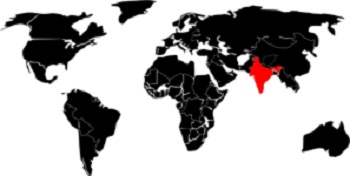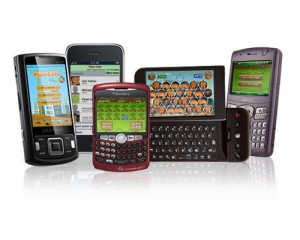Companies are offering more options when it comes to making mobile payments in India
Twitter has partnered with Lookup, developers of an application of the same name that connects consumers with retailers, to bring new mobile payments services to India. The Indian market has proven to be quite prominent in the mobile payments space, largely due to rapidly growing smartphone penetration and the fact that consumers are beginning to use their devices to shop online. The new services will be available through Twitter, and shoppers can use the handle @lookuplite for a variety of purposes.
Twitter will serve as a platform to connect merchants directly with consumers through Lookup
Twitter users will be able to send a direct message to Lookup to receive information about products that they may be interested in. They will also be able to use Lookup’s new handle to make appointments with certain organizations and, in some cases, complete mobile transactions. The social media company will not be handling the transactions made through the new service, serving instead as a sort of middleman for these payments.
Lookup boasts of more than 1.2 million registered users
 Lookup has been growing in popularity because of its ability to connect merchants directly with consumers. The company boasts of 1.2 million registered users despite only operating in Mumbai, Delhi, and Bangalore. Through Lookup, consumers are able to find a wealth of information about products being offered by merchants. The service can even be used to set up a transaction, allowing consumers to purchase the products that they are interested in.
Lookup has been growing in popularity because of its ability to connect merchants directly with consumers. The company boasts of 1.2 million registered users despite only operating in Mumbai, Delhi, and Bangalore. Through Lookup, consumers are able to find a wealth of information about products being offered by merchants. The service can even be used to set up a transaction, allowing consumers to purchase the products that they are interested in.
India continues to grow as a prominent mobile payments market
India has quickly established its as a prominent mobile payments market. Many consumers have begun using their mobile devices to shop online rather than visit physical stores. They see mobile shopping as more convenient, allowing them to bypass the traditional checkout process. Several organizations have begun coming to the country in order to find success with their mobile commerce endeavors, but competition has proven to be quite fierce in India. Companies like Lookup have managed to establish a strong foothold in India by providing unique services that appeal to mobile shoppers.
Nearly 35 percent of smartphone owners will update their handsets this year, regardless of current device function.
In Australia, the Deloitte mobile customer survey has revealed that regardless of whether or not the current mobile technology is still fully functional, 35 percent of smartphone owners will be updating their handsets at some point this year.
Nearly half of all mobile phone owners will be holding onto their current devices instead of trading them in or selling.
That said, when it comes to the same mobile technology survey, it appears that many Australians are hanging onto their old devices when they’re not using them anymore. While 48 percent plan to keep their current smartphones and continue using them, this year, 27 percent will give them away to someone else who can use them. Another 15 percent will recycle their old devices and 8 percent will sell them. Two percent plan to replace their devices because they have gone missing.
With only 15 percent selling their devices after they don’t need them, Australians are skipping an opportunity to make money.
 When comparing this trend to the rest of the world, it is Singapore that is the region with the largest number of people who sell their old device models. Among them, 26 percent have done so. In second place is the United Kingdom, where 21 percent of device owners will be selling their gadgets when they replace them. Japan is not far behind, with 20 percent taking part in this online selling opportunity. In Germany, 16 percent will do so. Australia is ahead of only Canada, where only 13 percent of consumers will sell their used devices when they purchase new ones this year.
When comparing this trend to the rest of the world, it is Singapore that is the region with the largest number of people who sell their old device models. Among them, 26 percent have done so. In second place is the United Kingdom, where 21 percent of device owners will be selling their gadgets when they replace them. Japan is not far behind, with 20 percent taking part in this online selling opportunity. In Germany, 16 percent will do so. Australia is ahead of only Canada, where only 13 percent of consumers will sell their used devices when they purchase new ones this year.
According to Jeremy Drumm, the lead author of the Deloitte report, a surprisingly large number of Australians simply tuck their older smartphone models into a drawer when they replace them. The majority do so in order to make sure they have a replacement quickly available if anything should happen to their newer model.
That said, this means that the mobile technology isn’t benefiting a friend or family member and it is not being sold in order to make a bit of money and provide someone else with an affordable device. This trend suggests that there is a considerable amount of waste being generated by the current device replacement habits in the country.
 Lookup has been growing in popularity because of its ability to connect merchants directly with consumers. The company boasts of 1.2 million registered users despite only operating in Mumbai, Delhi, and Bangalore. Through Lookup, consumers are able to find a wealth of information about products being offered by merchants. The service can even be used to set up a transaction, allowing consumers to purchase the products that they are interested in.
Lookup has been growing in popularity because of its ability to connect merchants directly with consumers. The company boasts of 1.2 million registered users despite only operating in Mumbai, Delhi, and Bangalore. Through Lookup, consumers are able to find a wealth of information about products being offered by merchants. The service can even be used to set up a transaction, allowing consumers to purchase the products that they are interested in.
 When comparing this trend to the rest of the world, it is Singapore that is the region with the largest number of people who sell their old
When comparing this trend to the rest of the world, it is Singapore that is the region with the largest number of people who sell their old 